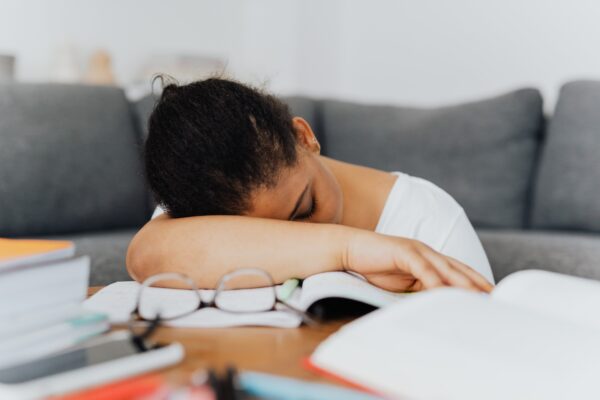Many students struggle to get enough sleep between homework, hanging out with friends, extracurricular activities, and screen time. This lack of sleep can have a negative impact on academic success. Studies show that well-rested students perform better in school, retain more information, and have improved focus and problem-solving skills. If you’re feeling sluggish during the school day or find it hard to concentrate, your sleep habits could be one of the main reasons.
How Much Sleep Do Students Need?
According to the Centers for Disease Control and Prevention (CDC), students 6-12 should get 9–12 hours of sleep per night, while teenagers need 8–10 hours. However, research shows that most students aren’t hitting these numbers. An Academy of Sleep Medicine study found that over 70% of high school students don’t get enough sleep on school nights. Another study from Stanford University found that students who sleep fewer than six hours per night are more likely to struggle with memory retention, focus, and problem-solving. Without sufficient sleep, students are disadvantaged before the school day begins.
The Connection Between Sleep and Academic Performance
- Better Memory & Learning
While we sleep, our brains process and store new information. Well-rested students are more likely to remember what they recently learned in class and perform better on tests and assignments. Studies show that students who get a full night’s sleep before an exam score higher than those who cram late.
- Improved Focus & Attention
Lack of sleep can make it harder to concentrate, stay engaged in lessons, and complete homework efficiently. Sleep-deprived students are more likely to struggle with focus, leading to lower grades and test scores.
- Stronger Problem-Solving Skills
Critical thinking and decision-making skills are essential for success in the classroom. Sleep helps the brain organize thoughts and solve problems more effectively, making tackling challenging assignments and exams easier.
- Better Emotional & Mental Health
Poor sleep is linked to increased stress, anxiety, and mood swings, which can affect motivation, social interactions, and classroom behaviour. Well-rested students tend to have a more positive attitude and more energy for school and learning.
Signs You Might Be Sleep-Deprived
If you’re experiencing any of the following, it might be time to change your sleep habits:
- Difficulty waking up in the morning
- Feeling tired or sluggish during the day
- Trouble focusing in class or while studying
- Frequent mood swings or irritability
- Relying on caffeine to stay alert
Tips for Better Sleep and Better Grades
- Stick to a Sleep Schedule—Go to bed and wake up at the same time every day, even on weekends. Having a consistent routine can help regulate your body’s internal clock.
- Limit Screen Time Before Bed – The blue light from phones, tablets, and TVs can disrupt sleep. Try putting devices away at least 30 minutes before bedtime.
- Create a Relaxing Bedtime Routine – Reading, guided meditation, listening to calming music, or practicing deep breathing can help signal to your brain that it’s time to sleep.
- Avoid Late-Night Cramming – Studying right before bed can overstimulate your brain and make it harder to fall asleep. Instead, review material earlier in the evening and get a good night’s rest before a big test.
- Get Active During the Day – Regular physical activity such as walking, jogging, weight training, or playing sports can improve sleep quality, but avoid intense workouts too close to bedtime.
- Watch Caffeine Intake – Energy drinks, sodas, and coffee can make it harder to fall asleep, especially if you have them in the afternoon or evening. Try not to drink caffeine any later than 8 hours before your bedtime.
Sleep is just as crucial as studying when it comes to academic achievement. By prioritizing sleep, you can improve your focus, memory, and overall performance in school. If you’re looking for an easy way to help boost your grades and feel better during the day, start with a good night’s sleep!
